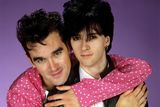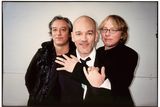In the wake of Oasis reunion rumours, we ask: is getting old bands back together ever a good idea?
Prompted by Noel Gallagher’s latest album release, fresh rumours of an Oasis reunion have begun to swirl.... but some dreams of bands reforming are best left in the realm of fantasy




Close your eyes for a moment and picture the scene: you’re standing in a field (or perhaps a stadium — let’s say Croke Park, for argument’s sake) on a balmy summer’s evening with 80,000 other people. There’s a warm pint of beer in one hand, a lighter held aloft in the other, and you’re singing at the top of your lungs: “Someday you will find me, caught beneath the landslide of a champagne supernova in the sky…” To some, it might sound like hell on earth. Or perhaps you’re emotional at the very thought of it. An Oasis reunion? Noel and Liam Gallagher putting aside their differences, the animosity, the public potshots? Nah. Surely not.
Right now, it’s difficult to imagine, even if the likes of Ray and Dave Davies from the Kinks — the notoriously discordant brothers who made the Gallaghers’ feud look like a playground squabble — have managed to reach some kind of unsteady truce in recent years.
Although rumours of the Britpop titans’ reformation bubble to the surface once or twice a year, it’s usually — forgive us for being cynical — when one or both of them have something to promote. And considering both Liam and Noel (who has just released Council Skies, his fourth and best album with his High Flying Birds band) are ploughing ahead with their solo projects, there is really no good reason to reform Oasis at present. Apart from the obvious financial windfall, that is.
The bigger question is would a reunion actually be any good on an artistic level? We all tend to view the past through rose-tinted glasses, but the truth is that Oasis — unlike their one-time contemporaries Blur (who are still knocking it out of the park) and Pulp (who have recently reunited for the second time) — were an inconsistent live band. When they were in form, they could go toe-to-toe with the greats. But who’s to say that they could recapture that magic with the enormous pressure of a large-scale reunion tour? As Noel Gallagher himself said recently: “Some things are best left in the past, y’know? They just are.”
Gallagher, in fact, was referring to another Mancunian band that has generated constant speculation regarding a reconciliation: the Smiths. Of course, the prospect of a full reunion with all four members is now sadly impossible, due to the recent sad death of the band’s virtuosic bassist Andy Rourke. It was already difficult to imagine, given the bitter royalties dispute that played out in court after their split.
Morrissey and Johnny Marr of the Smiths. Photo by Brian Rasic/Getty Images
Would it be a good idea for Morrissey and Johnny Marr to reunite, though? A diehard Smiths fan might love the idea of hearing what two songwriters who sparked off each other in a once-in-a-generation partnership might come up with in 2023. On the other hand, why run the risk of a band damaging their own remarkable legacy? There are some excellent tribute bands, such as These Charming Men, to sate the desire to hear those songs played live, while both artists still include Smiths songs in their solo sets.
In any case, a Morrissey and Marr alliance is highly unlikely: despite being offered a reported $5m to play Coachella in 2005, both musicians have been busy tending to their solo careers, with Marr’s in particular flourishing in recent years. More pertinently, their politics have diverged over the past few decades, too, if Morrissey’s public support of the far-right party For Britain is anything to go by.
The painful truth is, reunions of ‘iconic’ bands are rarely a good idea. Although there are some notable exceptions, audiences can often see through what is all too often a blatant money-grab (although at least the Sex Pistols had the humility to admit so with their ‘Filthy Lucre’ reunion tour in 1996.)
Read more
Then you have the bands who reform despite missing key members: there are certain Pink Floyd fans, for example, who will dispute the validity of the band without Roger Waters. David Gilmour and Nick Mason are apparently unperturbed, however, and have recorded three albums since Waters’ 1985 departure, as well as a new song, Hey Hey Rise Up, for a Ukrainian humanitarian relief charity just last year. Considering how Gilmour later dubbed Waters a “lying, thieving, hypocritical, tax-avoiding, lip-synching, misogynistic, sick-with-envy megalomaniac”, it’s safe to safe that we won’t see full original line-up playing live any time soon. Then again, that’s what a lot of people said about Fleetwood Mac.
As history has shown us, though, sometimes even musicians themselves know when something is a bad idea. The Velvet Underground split in 1973 (although Lou Reed had quit in 1970 and John Cale in 1968), leaving a groundbreaking, genre-defining series of albums behind. It should probably have stayed that way: a European reunion tour in 1993 featuring the original line-up was short-lived after Reed and Cale’s notoriously fractious relationship brought things to a premature halt.
John Cale and Lou Reed, former bandmates in the Velevet Underground, in 1989. Photo by Rita Barros/Getty Images
Then again, vanity has not prevented other bands from persevering, despite being down an original member or two: The Who (aka Pete Townshend and Roger Daltrey) continue to tour to this day and even released a new album in 2019 — although the deeply unconvincing Who saw them record their parts separately, and with three session drummers alone on the album’s credits. Considering how the pair reportedly communicate through their management and time has not mellowed their ornery attitudes toward each other, you wonder what the point is. It all seems a bit… well, sad. Do we really need to hear sub-par versions of Baba O’Riley just for the sake of saying that we’ve seen the Who? So much for “I hope I die before I get old.”
Of course, some reunions have been enormously successful despite having the odds stacked against them: whoever would have thought that Guns N’ Roses’ Axl Rose and Slash would be able to share a stage again without inflicting physical violence upon each other? Then there are the bands that you wish would get back together, confident in the knowledge that the result would be magical — like REM, a band that is at the top of many music fans’ reunion wishlists. Despite having been lucky enough to see Michael Stipe and co several times in Dublin before their amicable split in 2011, I would dearly (and selfishly) love another round with the band. The fact that the three remaining members — Stipe, Peter Buck and Mike Mills (Bill Berry quit in 1997) — have not embarrassed themselves with sub-par solo releases in the intervening years is a bonus; but 12 years is long enough. C’mon, guys, pick up the phone: it’s time for a greatest hits reunion tour. Preferably starting in Dublin.
Peter Buck, Michael Stipe and Mike Mills of REM, who split in 2011
On a local level, there is clearly an appetite for Irish reformations, too. Fight Like Apes discovered just how missed they were in March of this year, when their one-night-stand at Dublin’s Olympia Theatre sold out rapidly, seven years after they called it a day.
The band’s core, MayKay Geraghty and Jamie Fox, did it for the right reasons: “We sold out one night, and we were delighted, and it wasn’t worth feeling stressed or not great about anything else,” said Geraghty in an interview. “We don’t need to do these shows; we want to do them.”
The renaissance continues apace with another gig planned for the All Together Now festival in August. There are plenty of other Irish bands you’d love to take on another spin around the dancehall: The Immediate, JJ72, Whipping Boy. The campaign starts here.
There is a third category alongside ‘bands that should reform’ and ‘bands that shouldn’t reform’; this is ‘bands that you really want to reform, but probably shouldn’t’. Talking Heads fall squarely into this division. Considering David Byrne’s live shows are as vibrant and entertaining as ever, you’d wonder what magic he might conjure with his former bandmates Chris Frantz, Tina Weymouth and Jerry Harrison playing life-affirming albums such as Remain in Light live again. Yet considering things have been frosty between them since their last reunion for the Rock ’n’ Roll Hall of Fame induction in 2002, to say the least — with Weymouth scathingly declaring Byrne is “a man incapable of returning friendship” and Byrne admitting there was “bad blood” between its members — it’s probably best to move on.
And while I would cut off an arm to see the four members of Abba playing one last gig together, the truth is that it could never live up to expectation; sometimes, the idea of a band — especially one with members now in their seventies — reforming is more alluring than the reality. Besides, we now have a (superb) hologram show, Abba Voyage, that’s about as close to the real thing as possible.
But what do we know? According to recent comments by the Gallagher brothers’ former arch-nemesis Damon Albarn, he can “guarantee they’re going to reform. In fact, I’ve put money on it,” he said. “They’re brothers and it would be wonderful to see them reconcile.”
Perhaps he has the inside track. Maybe he’s just being optimistically kind, given his own band’s continued popularity. And of course, there’s always the possibility that he’s right, they’ve been playing us all along, and a global stadium tour is imminent.
Noel is right: some things are best left in the past — but sometimes you just want to stand in a field, throw your arms around your friends and sing along to the songs you spent your teenage years obsessing over. You may never fully recapture that magic, but nostalgia is one hell of a drug.




















